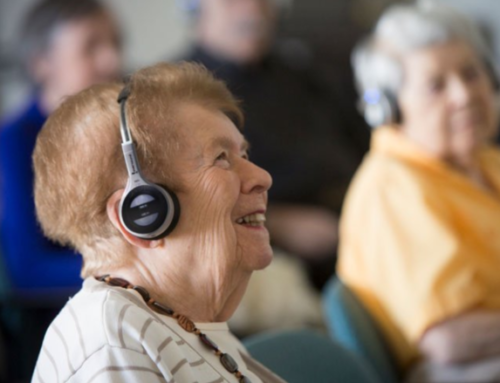Age-related hearing loss, also known as presbycusis, is a common condition that affects many individuals as they grow older. This gradual decline in hearing can impact various aspects of daily life, from having conversations to enjoying music. Recognizing and addressing this condition is crucial for maintaining a high quality of life and staying connected with loved ones. Understanding the causes, symptoms, and available treatments can help individuals manage their hearing loss effectively.
Causes of Age-Related Hearing Loss
Hearing is a complex process that involves the transmission of sound waves through the ear, where they are converted into electrical signals and sent to the brain. As people age, this process can be disrupted due to natural wear and tear on the auditory system. The tiny hair cells in the inner ear, which play a vital role in hearing, can become damaged or die over time. Once these cells are damaged, they do not regenerate, leading to permanent hearing loss.
Several factors can contribute to the progression of age-related hearing loss. Genetics plays a significant role; if there is a family history of hearing loss, the likelihood of experiencing it increases. Additionally, prolonged exposure to loud noises, whether from occupational environments or recreational activities, can accelerate hearing damage. Health conditions such as diabetes and hypertension can also negatively impact hearing by affecting blood flow to the auditory system. By understanding these causes, individuals can take steps to protect their hearing and potentially slow the progression of hearing loss.
Recognizing the Symptoms
Recognizing the symptoms of hearing loss early can make a significant difference in managing the condition effectively. One of the most common signs is difficulty hearing conversations, especially in noisy environments. People may find themselves frequently asking others to repeat themselves or feeling that others are mumbling. Another indication is the need to increase the volume on televisions, radios, or other audio devices to understand what is being said.
Hearing loss can also lead to social withdrawal and feelings of isolation, as it becomes more challenging to engage in conversations and social activities. This can have a profound impact on mental health and overall well-being. Regular hearing check-ups are essential for early detection and intervention. By identifying hearing loss early, individuals can explore various management options to improve their hearing and maintain their senior living quality.
Tips for Managing Hearing Loss
Managing hearing loss involves a combination of communication strategies, environmental modifications, and lifestyle changes. Effective communication strategies can significantly enhance interactions with others. Speaking clearly and at a moderate pace, facing the person you are talking to, and reducing background noise can help make conversations more understandable. It is also helpful to use visual cues, such as facial expressions and gestures, to aid communication.
Making environmental modifications can also improve hearing experiences. Using assistive listening devices, such as amplified telephones and hearing loops, can make a big difference. Optimizing room acoustics by adding carpets, curtains, and soft furnishings can reduce echo and background noise, making it easier to hear. Additionally, protecting ears from loud noises by using earplugs or noise-canceling headphones can prevent further hearing damage.
Lifestyle changes play a crucial role in managing hearing loss. Maintaining overall health through regular exercise and a balanced diet can support auditory health. Avoiding smoking and limiting exposure to secondhand smoke is also beneficial, as smoking can impair blood flow to the inner ear. By adopting these tips, individuals can better manage their hearing loss and continue to enjoy their daily activities.
Treatment Options
Various treatment options are available for those experiencing age-related hearing loss, each tailored to different levels of severity and individual needs. Hearing aids are the most common treatment and come in a variety of styles, from behind-the-ear models to small, in-ear devices. These aids amplify sounds, making it easier to hear conversations and ambient noises. The technology in hearing aids has advanced significantly, offering features such as noise reduction, directional microphones, and connectivity to smartphones and other devices.
For individuals with more severe hearing loss, cochlear implants might be a suitable option. Unlike hearing aids, which amplify sound, cochlear implants bypass damaged parts of the ear and directly stimulate the auditory nerve. This can provide a sense of sound to those who receive little benefit from traditional hearing aids. The effectiveness of cochlear implants varies, but many users report significant improvements in their ability to hear and understand speech.
Other medical treatments may include medication or surgery, depending on the underlying cause of hearing loss. In some cases, treating related health conditions like hypertension or diabetes can improve hearing outcomes. Audiologists and healthcare providers can offer personalized recommendations based on the individual’s specific situation, ensuring the most effective treatment plan is in place.
Living Well with Hearing Loss
Living with hearing loss requires embracing support systems and utilizing available resources to maintain a fulfilling life. Family and friends play a crucial role in providing emotional and practical support. Open communication about hearing loss and its challenges can help loved ones understand and offer the necessary assistance. Joining support groups, either in-person or online, can provide a sense of community and shared experience, offering practical advice and emotional support.
Technological advancements continue to improve the quality of life for those with hearing loss. Devices such as personal amplifiers, alerting systems, and captioned telephones can enhance daily living. Additionally, many public places are now equipped with hearing loop systems, making it easier for individuals with hearing aids to participate in activities and events. Staying proactive in seeking out and using these resources can greatly enhance one’s ability to live well with hearing loss.
Maintaining a positive attitude and staying engaged in activities and hobbies is essential. By focusing on what can be controlled and making the most of available treatments and support, individuals can continue to enjoy a rich and fulfilling life. The journey with hearing loss is unique for everyone, but with the right tools and mindset, it is possible to navigate this condition successfully.
Embracing a Full Life with Hearing Loss
Addressing age-related hearing loss is vital for maintaining a high quality of life as we age. Understanding the causes and symptoms of hearing loss allows for early detection and intervention. Implementing strategies to manage hearing loss and exploring various treatment options can significantly improve daily interactions and overall well-being.
Living with hearing loss does not mean giving up on enjoying life. By leveraging available support systems, utilizing technological advancements, and maintaining a positive outlook, individuals can continue to thrive. Hearing loss is a challenge, but with the right approach, it is entirely manageable.
About River Point of Kerrville
River Point of Kerrville, located in Kerrville, TX, is dedicated to providing exceptional assisted living and memory care services. Our community offers a vibrant and supportive environment where residents can live life to the fullest. We invite you to experience the care and compassion that make our community unique.






